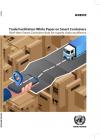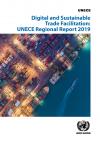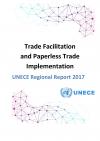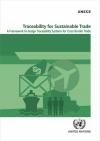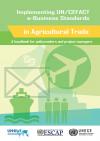Publications
Displaying Results 41 - 60 of 115
- English
Technology is entering into every aspect of the supply chain and providing performant and innovative tools. As many are just starting to talk about the dematerialization of certain documents used in trade and transport, others are investigating how devices can communicate information directly to the rest of the supply chain without human intervention. Smart Containers are taking the digital
- English
Trade facilitation is a key factor in national competitiveness and in the economic development of countries. At the same time, the development of a simplified and automated trade environment is a challenging reform programme for any country. It requires strategic vision, leadership, change management, collaboration, and coordination between various stakeholders. It is also a well-known fact
- English
It is fair to say that trade facilitation is a key policy priority for most if not all the trading nations. The benefits for implementing trade facilitation provisions such as the ones in the World Trade Organization’s (WTO) Trade Facilitation Agreement are well documented. However, the need for measuring progress of the provisions remain as strong as ever. Since 2015 the United Nations
- English
Within the United Nations Economic Commission for Europe (UNECE), the United Nations Centre for Trade Facilitation and Electronic Business (UN/CEFACT) has developed a series of some 30 recommendations and standards that are used worldwide to simplify, standardize and harmonize trade procedures and information flows. Many of these are now international standards of the International
- English
Gender Responsive Standards publication (ECE/TRADE/445) makes the case for mainstreaming gender in the development and implementation of standards. The first chapter places the discussion in the larger perspective of how standards contribute to the achievement of the Sustainable Development Goals of Agenda 2030. It reviews the role of
- English
Streamlining border crossing and helping traders to access international markets can provide significant stimulus to national economies and directly supports the implementation of UN Sustainable Development Goal (SDG) 17, specifically on promoting a universal, rules-based, open, non-discriminatory and equitable trading system in target 17.10. One of the key smart connectivity solutions a
- English
Public procurement alone represents 15-20% of the global GDP, while procurement commitments under the World Trade Organization’s Agreement on Public Procurement (GPA) have been estimated at around EUR 1.3 trillion. This is enormous purchasing power that can drive investment and innovation towards more sustainable production and consumption patterns, to address for instance, challenges linked
- English
This publication (ECE/TRADE/444) presents the results of an ongoing research on the practical experience of regulatory authorities, governments and local administrations, as well as regional groups of countries, in using standards towards sustainable development and the implementation of the 2030 Agenda.
The focus of the present volume
- English
This Publication (ECE/TRADE/440) advocates for integrating education about standardization into the curricula of educational establishments. It presents evidence of the relevance of standards for policymakers and business executives as well as professionals. It then reviews the efforts of UNECE since 2012 to date to improve education about
- English
This Guide (ECE/TRADE/441) is a practical tool to help trainers in the preparation, delivery and follow up to a set of training workshops.
Both this guide and the workshop materials have been prepared by the UNECE Secretariat, with the support of subject matter experts as well as training experts. All training materials can be
- English
The Economic Commission for Europe (UNECE) has a long history of offering trade facilitation guidance, especially on the topic of Single Window. Since its emergence in 2004, Recommendation 33 on implementing a Single Window has been widely received as the reference on the subject and is used as the basis for many other organizations’ work as well as the cornerstone of many national
- English
As the second most polluting industry, the textile sector is responsible for a large portion of the world’s CO2 emissions and industrial waste, not to mention the exploitation of “indecent” working conditions. At the same time, the industry has a complex value chain, with production facilities located all over the world, which makes it very hard to gain accurate information about sources and
- English
Within the United Nations Economic Commission for Europe (UNECE), the United Nations Centre for Trade Facilitation and Electronic Business (UN/CEFACT) has developed a series of some 30 recommendations and standards that are used worldwide to simplify, standardize and harmonize trade procedures and information flows. Many of these are now international standards of the International
- English
Since the introduction in 1973 as the UNECE Recommendation No. 1, the UN Layout Key (UNLK) has provided Governments, organizations and the business community with a basis for a standard and aligned design of documents used in trade and transport. This has led to a major improvement in the standardization of trade documents in many countries throughout the world.Most international organizations
- English
Recommendation 42 on Trade and Transport Facilitation Monitoring Mechanisms (TTFMM) addresses issues related to institutional arrangements and methodology in designing and implementing TTFMM. It is an important contribution to UNECE’s suite of Trade Facilitation recommendations and guidance material.Download the Publication ECE/TRADE/
- English
Facilitating trade is about streamlining and simplifying international trade, particularly import and export procedures, transit requirements and procedures applied by Customs and other agencies (UNECE-UN/CEFACT). With the rapid increase of international trade, thanks in part to the reduction of tariffs and quotas, it has become evident that for countries to benefit from open global markets it
- English
Public-Private Partnerships (PPPs) is a possible solution for financing and implementing public projects. These projects allow the public sector to benefit from private sector funding, expertise and capacity while allowing the private sector to partner with the public sector in providing critical public services. There are a number of areas within Trade Facilitation
- English
The joint UNECE-OECD publication “International Regulatory Cooperation: the Case of the United Nations Economic Commission for Europe” presents the rule-making and standards-setting activities of UNECE.
It is illustrated by a number of examples that show how UNECE impacts our daily lives, including through:
- English
Consumers and producers are increasingly interested in knowing how products are made and whether there are any adverse environmental or social impacts. While two products may look or feel similar, consumers may still distinguish between them on the basis of certain intangible policy claims, such as whether they are “organic” or “sustainably produced”. Since these types of claims are difficult
- English
This Handbook presents a general framework for the design of of e-Business projects in the agrifood sector using open, international standards. It specifically looks at four e-Business standards developed by UN/CEFACT in the areas of:Electronic phytosanitary certificates; Electronic reporting of sustainable fishery management; Electronic exchange of laboratory


